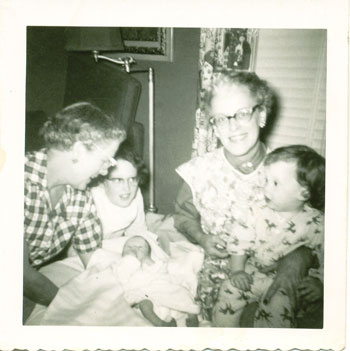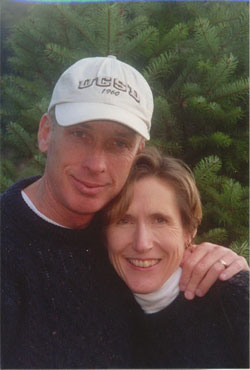Coming Closer to Myself: Reflections on Turning 50
For Sunday October 23, 2005
Lectionary Readings (Revised Common Lectionary, Year A)
Deuteronomy 34:1–12 or Leviticus 19:1–2, 15–18
Psalm 90:1–6, 13–17 or Psalm 1
1 Thessalonians 2:1–8
Matthew 22:34–46
 |
Dan and Molly. |
When you read the weekly lectionary Scriptures with Christians around the world, every so often you enjoy a personal serendipity. This week I write just a few days shy of my fiftieth birthday, and as God would have it the readings this week include Psalm 90, a prayer that is attributed to Moses and rich with poignancy and pathos befitting my milestone. I'll invoke the privilege of my birthday to quote it in full.
Lord, you have been our dwelling place
throughout all generations,
Before the mountains were born
or you brought forth the earth and the world,
from everlasting to everlasting you are God.You turn men back to dust,
saying, "Return to dust, O sons of men."
For a thousand years in your sight
are like a day that has just gone by,
or like a watch in the night.
You sweep men away in the sleep of death;
they are like the new grass of the morning—
though in the morning it springs up new,
by evening it is dried and withered.We are consumed by your anger
and terrified by your indignation.
You have set our iniquities before you,
our secret sins in the light of your presence.
All our days pass away under your wrath;
we finish our years with a moan.
The length of our days is seventy years—
or eighty, if we have the strength;
yet their span is but trouble and sorrow,
for they quickly pass, and we fly away.Who knows the power of your anger?
for your wrath is as great as the fear that is due you.
Teach us to number our days aright,
that we may gain a heart of wisdom.Relent, O Lord! How long will it be?
Have compassion on your servants.
Satisfy us in the morning with your unfailing love,
that we may sing for joy and be glad all our days.
Make us glad for as many days as you have afflicted us,
for as many years as we have seen trouble.
May your deeds be shown to your servants,
your splendor to your children.May the favor of the Lord our God rest upon us;
establish the work of our hands for us—
yes, establish the work of our hands.
 |
Dan, in earlier years. |
The brevity of my life which vanishes like the night, the inevitability of my death regardless of how many marathons I run or how carefully I watch my diet, the futility of every effort to transcend my finitude, and the clarity of my failures, faults, and sins that feels like a glaring exposure before a holy God—these are the blessed birthday reminders of the Jewish poet.
The Psalmist's somber reminders are "blessed" even though at first glance they read like a recipe for anxiety and despair. At my stage, the ordinary experiences of everyday life might suggest just that. I resonated with a friend at church on Sunday who reminisced, "about twenty years ago when I turned fifty I wrote a poem; it was so depressing!"
At fifty, gaining weight is easy, staying in shape is hard. I once exercised out of vanity; now I exercise out of necessity. My biology is my certain destiny, and already my body betrays me—but nothing like the destiny of dust that awaits me. However skillful my future mortician, I too will revert to star dust, wither like dry grass, just as the Old Testament reading for this week describes the burial of venerable Moses in an unmarked grave. My family of origin is my inherited legacy, for good and ill. Professional accomplishments bring limited fulfillment; why did I ever imagine otherwise? Personal inadequacies unsettle me. The consequences of some life choices feel irreversible, as when my son went to college three years ago and I cried when I realized that whatever parenting I had done with him for eighteen years had finished an important phase. Last month we deposited a second son at college and blubbered as we drove home that "things will never be the same" with him. True enough.
So, if you live anything like a normal life, sorrow and heartache visit you sooner or later, and certainly by the time you reach fifty—whether through your parents, spouse, children, friends, boss, job, the stock market, the random roll of the genetic dice, plain old bad luck (if a Christian can use the word "luck"), or from what Wendell Berry once called our "irremediable ignorance." "Life is difficult," wrote M. Scott Peck in one of the most famous first sentences ever (The Road Less Traveled) ; he too was recently "swept away in the sleep of death" on September 25 from pancreatic and liver cancer at the age of 69. So, brutal realism, modesty, and the embrace of the fleeting mystery of life all befit a person turning fifty. I resonate with the many people who quote the lines of the German poet Rilke about "living the questions."
 |
Dan and family. |
Some people at my age resist the analysis of the Psalmist as too gloomy and overly pessimistic, and instead throttle full speed ahead as if nothing had changed. Displaced desires, reversion to superficial pursuits, social affectations, sublimation through obsessive work, escapism through play, cutting and running, and the old stand-by denial are all strategies people employ to avoid the obvious, that my banal, ordinary life is speeding toward completion, and that with what the Psalmist describes as "labor, sorrow and a moan."
Kierkegaard describes in detail his own carefully crafted avoidance mechanism. Throughout his short life (1813–1855) he battled a pronounced and chronic melancholia that was bequeathed to him by his pietistic and stern father, exacerbated by his public humiliation in Copenhagen's rollicking newspaper the Corsair, compounded by his sense of victimization, and neuroticized in his broken engagement with Regina Olsen. His hypochondria did not help, either. For much of his life, he tells us, through a monumental effort of repression, diversion, and displacement, Kierkegaard distracted and protected himself from his melancholia through his prodigious writing. And there is no doubt that his melancholia served as a fund for enormous artistic creativity and interior reflection (a fact not lost on psychiatrist Peter Kramer in his recent book Against Depression). But at one point Kierkegaard believed that instead of distancing himself from his melancholia, holding it at arm's length, he needed to embrace it, because he began to interpret his depression as a form of despair.
Invoking a distinctly Christian audacity, Kierkegaard made peace with his melancholia, and even believed that God forgave him for his proclivity to despair. Even though one might justifiably feel increasingly old and world-weary because of the litany of woes described by the Psalmist, in relation to eternity, insists Kierkegaard, one can live "forever young." Overwhelmed by God's love that overwhelmed his melancholic despair, he describes coming close to his self that he had formerly analyzed at a distance:
Alas, ultimately I know of no truer prayer than what I pray over and over, that God will at any rate allow me—that he will not be angry at me—that he will allow me to thank him continually, thanking him because he has done, and indeed, continues to do, so indescribably much more for me than I had ever expected. Surrounded with mockery; plagued day in and day out by the pettiness of people, even of those closest to me, I know of nothing else to do in my home or in my inmost being, but to give thanks and to thank God, for I understand that what he has done for me is indescribable...He permits me to weep before him in quiet solitude, to weep away my pain again and again, blessedly consoled in the knowledge that he is concerned for me—and at the same time he gives this life of pain a significance that almost overwhelms me, he grants me success and strength and wisdom in all my accomplishments...Now life is coming closer to me, or I am coming closer to myself, coming to myself.
Kierkegaard and the Psalmist provoke me to take inventory of my fleeting life, to seek a heart of wisdom, and to embrace rather than resist what is at any rate inevitable. In my human imperfections and limitations, they insist I can discover divine consolations.
 |
Dan and Patti. |
They further point me to confidence, joy and gratitude. In a culture of victimization it takes audacity to celebrate gratitude for life itself with all its problems. In a society that winks at greed and encourages entitlement, contentment with your station in life supposes a radical experience of grace. In a world of staggering pain and inequality there is still cause to "enjoy every sandwich" (Lamott).
Employing a delightful literary metaphor, Kierkegaard's biographer Joakim Garth reminds us that "a person does not need to be anything other or greater than his own little faltering preface—in the confidence that at some point in eternity God will surely bring order out of the individual's divided and piecemeal tale and write an emphatic postscript."1
For further reflection:
* To what extent do your own life experiences resonate with Psalm 90?
* How does our culture treat aging and the elderly, and how does that compare with other cultures?
* What strategies have you observed that people use to embrace or deny what the Psalmist describes?
* Further reading: The Consolations of Imperfection; Learning to Appreciate Life's Limitations, by Donald McCullough; and Joan Chittister, Scarred By Struggle, Transformed By Hope.
[1] On the last two paragraphs see Joakim Garth, Soren Kierkegaard; A Biography, translated by Bruce H. Kirmmse (Princeton: Princeton University Press, 2005), pp. 283, 545, 569.





